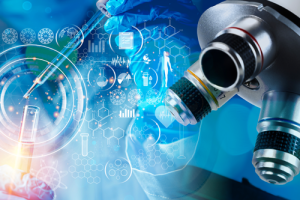Biotechnology vs. Bioinformatics: What's the Difference?
Published April 28, 2025

Both biotechnology and bioinformatics offer exciting opportunities for growth and innovation. Each field works to advance our understanding of biological sciences, yet they do so in distinct ways.
For anyone considering a Master of Science degree in one of these fields, it’s important to understand the nuances of each and how they align with your personal and professional goals. We’ll guide you through the key considerations to help you determine the best path for your future.
What is Biotechnology?
As the name suggests, biotechnology combines principles of biology and technology to develop innovative solutions across various industries. Biotechnologists use living organisms and their derivatives to develop advanced products and technologies for healthcare, agriculture, and the environment.
What is Bioinformatics?
The field of bioinformatics merges biology, computer science, and data analysis to interpret and manage large quantities of biological data. Bioinformatics professionals use computational tools and techniques to understand complex biological processes, such as gene sequencing and protein structure prediction.
This field is essential for advancements in genomics, personalized medicine, and other areas where large-scale data sets are analyzed to unlock new insights.
Biotechnology vs. Bioinformatics: Similarities
Biotechnology and bioinformatics share similar names, and there is a lot of overlap in their areas of study.
Genomics and Proteomics
Both fields include the comprehensive study of genomics, which encompasses the intricate analysis of genomes’ structure, function, evolution, and mapping. They both also include the extensive examination of proteins (proteomics), specifically focusing on their intricate structures and multifaceted functions.
The knowledge acquired from both areas of study helps scientists unravel the intricate biological mechanisms that underlie health and diseases.
Data Analysis and Computational Biology
Bioinformatics heavily focuses on using computational tools to analyze biological data, such as genetic sequences.
Computational methods are also used in biotechnology to predict outcomes and streamline research processes, especially in fields like drug discovery and development.
Biotechnology Applications in Healthcare
Both fields contribute to advancements in healthcare. Bioinformatics provides tools for analyzing complex biological data, which biotechnologists then use to develop new medical treatments, diagnostic tools, and biopharmaceuticals.
Biotechnology vs. Bioinformatics: Differences
Although there are many similarities, there are several key differences that prospective graduate students should note before deciding which field to pursue in a master’s program.
Focus on Computational Methods vs. Experimental Techniques
Bioinformatics primarily revolves around the use of computational tools and techniques to analyze and interpret biological data. This includes areas like genome sequencing, protein structure prediction, and data mining from biological databases. Graduate programs in bioinformatics often focus on subjects like data analysis, algorithm development, and computational modeling.
Biotechnology, on the other hand, emphasizes experimental techniques and the application of biological systems for industrial and medical purposes. The focus is more on laboratory-based research and development, including genetic engineering, drug development, and bioprocessing. Students in biotechnology master’s programs typically study topics like molecular biology, biochemistry, and laboratory techniques.
Application in Business and Entrepreneurship
Some biotechnology programs integrate business-oriented courses that prepare students for leadership roles in biotech companies. In addition to biotechnology studies, these programs might include courses in intellectual property, regulatory affairs, product development, and marketing. These equip students with the business skills needed to manage or start biotech enterprises.
Bioinformatics programs, on the other hand, are less focused on business aspects and more on the scientific and technical challenges of managing and interpreting large biological datasets. The curriculum is more aligned with preparing students for research and development roles within academia.
Areas of Specialization
Bioinformatics programs offer specializations in areas like computational biology, biostatistics, and systems biology. Students learn to handle complex data related to genetics, genomics, and proteomics.
In contrast, biotechnology students can specialize in diverse areas, including but not limited to bioprocess engineering, drug development, and agricultural biotechnology. The focus here is more on applying biological principles to create new products and technologies.
Bioinformatics or Biotechnology: Which is Better?
Those considering an advanced degree program in biotechnology or bioinformatics should know that one field isn’t necessarily “better” than the other. Rather, your pursuit of a master’s program should be made based on the following criteria:
- Career Goals: Do you envision yourself working in a lab, developing new biological products, or analyzing complex data in a computational environment?
- Educational Background: Which field better complements your previous education? A strong foundation in biology might lead you toward biotechnology, while a background in computer science might make bioinformatics a better fit.
- Industry Demand: Consider current and future job market trends, as well as the sectors you’re most passionate about, such as healthcare, agriculture, or pharmaceuticals.
- Skill Set: Assess your comfort and interest in lab-based work versus computational tasks. Biotechnology often involves hands-on experiments, while bioinformatics focuses on data analysis and software development.
- Program Structure: Look at the curriculum and specializations offered by each program. Does the program provide opportunities for research, internships, or industry partnerships that align with your professional goals?
- Long-Term Impact: What type of impact do you want to make in the field, such as the development of new technologies and treatments or the advancement of our understanding of biological data through computational means?
Earn Your Master of Science Degree at JHU AAP
The Johns Hopkins’ master’s degrees in Biotechnology and Bioinformatics offer a level of flexibility designed for busy working professionals who are ready to advance their careers. Our courses are taught online to fit your schedule so you can get the education you deserve on your own time.
All of our courses are taught by world-renowned faculty and include a wide range of elective specializations to suit your interests.
Learn more about JHU AAP’s graduate programs for working adults, including tuition and fees. Ready to apply? Start your application today!